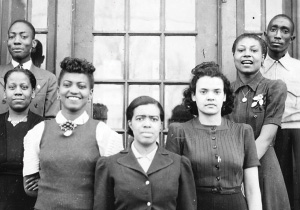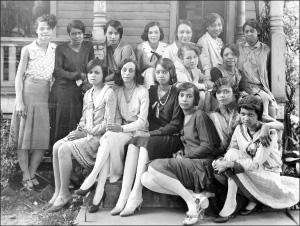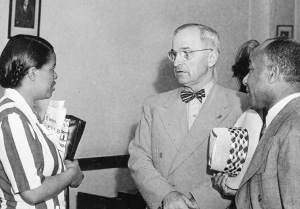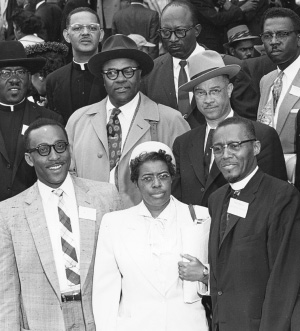About Lucile H. Bluford
About Lucile H. Bluford
To view the exhibit about Ms. Bluford, with additional photographs, visit the Lucile H. Bluford Branch at 3050 Prospect Avenue.
Lucile H. Bluford: 1911 - 2003
 The Kansas City Call employees in front of the newspaper’s offices with Miss Bluford at center, ca. 1930s. Image courtesy: The Kansas City Call.
The Kansas City Call employees in front of the newspaper’s offices with Miss Bluford at center, ca. 1930s. Image courtesy: The Kansas City Call.
The Lucile H. Bluford Branch of The Kansas City Public Library stands as a tribute to one of the city’s most accomplished and beloved individuals. From her early days as a student at Lincoln High School and the University of Kansas to her long and distinguished career at The Kansas City Call, Miss Bluford used her journalistic talents to champion civil rights and strengthen the African-American community.
Promising Beginnings
Miss Bluford’s lifelong success stemmed from the early influences of her supportive family and quality education. Born Lucile Harris Bluford on July 1, 1911, in Salisbury, North Carolina, to parents John and Viola, she remembered reading as an important part of her early life. Her father, a professor at North Carolina Agricultural & Technical University, read the newspaper “from cover to cover everyday,” and as a child Miss Bluford would “sit out on the swing. . . and. . . read all day long.” After her mother’s death in 1915, Miss Bluford went to live with her grandmother, Mariah Harris, while her brothers John, Jr. and Guion moved in with other relatives. She was quite close to her grandmother, who she said “taught me everything I knew.”
In 1918, John Bluford, his new wife Addie, and Miss Bluford’s brothers moved west to Kansas City. John became a science teacher at all-black Lincoln High School, where he taught for more than 25 years. Miss Bluford joined her family in 1921 at the age of 10 and attended Wendell Phillips Elementary and Lincoln High. She demonstrated an early passion for journalism and civic engagement as a member of her school newspaper and yearbook staffs, the student chapter of the NAACP, and the student council. After school she often spent time on 18th and Vine Streets at the offices of The Kansas City Call, the black newspaper founded by Chester A. Franklin in 1919 that would become the focus of Miss Bluford’s long career. Like other black newspapers in Kansas City and across the country, The Call provided a critical alternative to white-owned papers that generally ignored the African-American community.
The Makings of a Journalist
 Miss Bluford (back row, 2nd from left) with her Alpha Kappa Alpha sorority sisters, 1930. Image courtesy: Kenneth M. Spencer Research Library at the University of Kansas.
Miss Bluford (back row, 2nd from left) with her Alpha Kappa Alpha sorority sisters, 1930. Image courtesy: Kenneth M. Spencer Research Library at the University of Kansas.
Racial discrimination in Missouri’s public universities prevented Miss Bluford from going to the University of Missouri in Columbia’s prestigious journalism school. Instead, she enrolled at the University of Kansas in September 1928 and quickly proved her talents as a reporter and editor. Miss Bluford credited Marie Ross, the first minority student to graduate from KU’s School of Journalism and a future Call section editor, with helping white students and teachers understand the importance of the black press. Though Miss Bluford’s classmates supported her and even nominated her for membership in the KU chapter of the journalism honor sorority, national officials denied her admission based on her race.
 Miss Bluford meeting with Harry S. Truman in his Senate office, ca. 1935. Image courtesy: The Kansas City Call.
Miss Bluford meeting with Harry S. Truman in his Senate office, ca. 1935. Image courtesy: The Kansas City Call.
Miss Bluford worked at The Call each summer during college, but after graduation in 1932 she moved to Atlanta and began writing for The Daily World. Homesick and repelled by Atlanta’s strict public segregation, she soon returned to Kansas City, where she briefly worked for The Kansas City American before joining The Call as a cub reporter. From the beginning she preferred writing hard-hitting news and political stories, and published many of her more controversial pieces under the pseudonym “Louis Blue.” The Great Depression of the 1930s left Call staff with little money to live on, but careful bookkeeping and the leadership of Chester A. Franklin kept the paper afloat. Miss Bluford’s tireless work ethic and devotion to The Call even in these hard times helped her move up the ranks to become managing editor by 1938.
Fighting for Change
In 1939, Miss Bluford applied to the University of Missouri’s graduate program in journalism. She had a successful career at The Call and didn’t need further training, but she saw an opportunity to challenge segregation in public universities. She had reason to hope for admission, since the previous year the U.S. Supreme Court had ruled that the University of Missouri School of Law must admit St. Louisan Lloyd Gaines or establish a law school at all-black Lincoln University. Though the MU journalism program accepted Miss Bluford based on mailed transcripts, when she showed up to enroll officials saw she was black and denied her entrance.
With the support of the NAACP, Miss Bluford sued the university. In 1940, her case reached the Missouri Supreme Court, which ruled in State ex rel. Bluford v. Canada that the university had until February 1941 to establish a journalism program at Lincoln. She continued applying unsuccessfully to the University of Missouri’s superior program, and neither she nor Gaines chose to attend the new professional schools at Lincoln. The courts may have upheld “separate but equal” education, but these cases received national attention as milestones on the way to educational desegregation. In May 1954, the United States Supreme Court ruled unanimously against segregation in Brown v. Board of Education of Topeka.
Heeding The Call
 Miss Bluford (center at bottom) at a civil rights march at the Lincoln Memorial, Washington, D.C., ca. 1958. Image courtesy: The Kansas City Call.
Miss Bluford (center at bottom) at a civil rights march at the Lincoln Memorial, Washington, D.C., ca. 1958. Image courtesy: The Kansas City Call.
Call editor Chester A. Franklin passed away in 1955, leaving Miss Bluford to take on the position she would hold until the end of her life. From its founding, The Call had covered the struggles and triumphs of the African-American community. Miss Bluford became editor at a pivotal moment in the history of the civil rights movement, and she maintained the paper’s original mission to draw people together in the fight against racism.
Over the course of the next five decades, Miss Bluford and the newspaper she led took a decisive stand on hundreds of important issues. Miss Bluford’s editorials supported the boycott of local department store lunchrooms that prohibited black patrons, mourned the assassination of Dr. Martin Luther King, Jr. and the subsequent civil unrest, and supported the election of Kansas City’s first African-American congressman, Alan Wheat, and first African-American mayor, Emanuel Cleaver II. Whatever the issue, black and white Kansas Citians knew they could find accurate information and thoughtful opinions in Miss Bluford’s words.